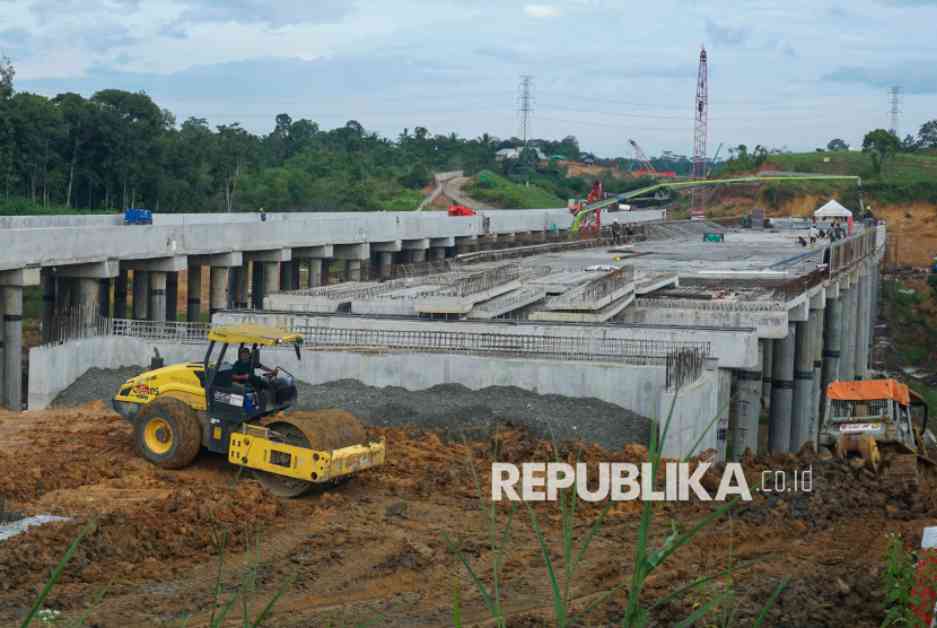Ali Berawi, a prominent figure in the development of the IKN infrastructure project, has recently stepped down from his position as the Deputy for Green and Digital Transformation at the IKN Authority. This decision came as a result of a request from the dean of the University of Indonesia (UI), prompting Berawi to return to his teaching duties at the Faculty of Engineering.
The IKN project, specifically the construction of the IKN Section 3A toll road in Balikpapan, East Kalimantan, has been making significant progress. The 13.4-kilometer toll road is nearing completion, with approximately 90% of the work finished. Once operational, this toll road is expected to reduce travel time from Balikpapan to the IKN Core Government Center (KIPP) to just 45 minutes, a significant improvement from the previous two-hour journey.
Ali Berawi, who previously held the position of Professor at the Faculty of Engineering, was reassigned to the IKN Authority as part of the Green and Digital Transformation team in 2022. However, a recent letter from the Dean of the Faculty of Engineering at UI requested his return to teaching duties. According to Troy Harrold Yohanes Pantouw, the Special Staff for Public Communication at the IKN Authority, the official request for Berawi’s reassignment was received on February 7, 2025.
The letter from the Dean of the Faculty of Engineering stipulated that Ali Berawi would resume teaching duties at UI starting in the second semester of the 2024/2025 academic year. This transition marks a significant shift for Berawi, who has been instrumental in driving the green and digital transformation initiatives within the IKN project.
It is worth noting that the IKN Authority comprises employees from various ministries, government agencies, provincial and municipal governments, as well as the private sector. These employees are assigned to the IKN Authority based on the rotation policies of their respective institutions, as regulated by the National Civil Service Agency and the Ministry of Administrative and Bureaucratic Reform.
Berawi’s departure from his role at the IKN Authority comes at a critical time, amidst concerns about delays in the IKN development project. The progress of the IKN project has faced challenges and obstacles, highlighting the importance of strong leadership and strategic decision-making in complex infrastructure initiatives.
Expert Insights on IKN Development
To gain a deeper understanding of the implications of Ali Berawi’s departure on the IKN project, we turned to Dr. Maya Soetoro, an infrastructure development expert at the Center for Sustainable Development and Global Competitiveness. Dr. Soetoro emphasized the significance of continuity in leadership roles within large-scale infrastructure projects, citing the need for consistent vision and direction to overcome obstacles and drive progress effectively.
“In the realm of infrastructure development, leadership transitions can introduce uncertainties and disruptions that may impact project timelines and outcomes. It is essential for project stakeholders to ensure a smooth handover process and maintain a cohesive strategy to navigate challenges successfully,” Dr. Soetoro stated.
As the IKN project continues to evolve and expand, the departure of key personnel like Ali Berawi underscores the dynamic nature of infrastructure development initiatives. The ability to adapt to changing circumstances and maintain a resilient approach to project management will be crucial in ensuring the long-term success of the IKN project.
Future Prospects for IKN Infrastructure
Looking ahead, the IKN Authority faces a pivotal juncture in its development trajectory, with critical decisions and strategic actions shaping the project’s future. The completion of the IKN Section 3A toll road represents a significant milestone in the broader vision of the IKN project, which aims to enhance connectivity, sustainability, and economic growth across Indonesia.
As stakeholders navigate the complexities of infrastructure development and urban planning, the lessons learned from the IKN project will inform future initiatives and strategies in the realm of sustainable development. By fostering collaboration, innovation, and stakeholder engagement, the IKN Authority can overcome challenges and realize its vision of a vibrant, interconnected, and resilient urban environment.
In conclusion, Ali Berawi’s transition back to his teaching role at the University of Indonesia marks a pivotal moment in the IKN project’s evolution. His contributions to the green and digital transformation agenda have laid a solid foundation for future initiatives, highlighting the importance of visionary leadership and strategic foresight in driving sustainable urban development. As the IKN project continues to progress, stakeholders must remain agile, adaptive, and committed to realizing a prosperous and sustainable future for Indonesia’s urban landscape.














